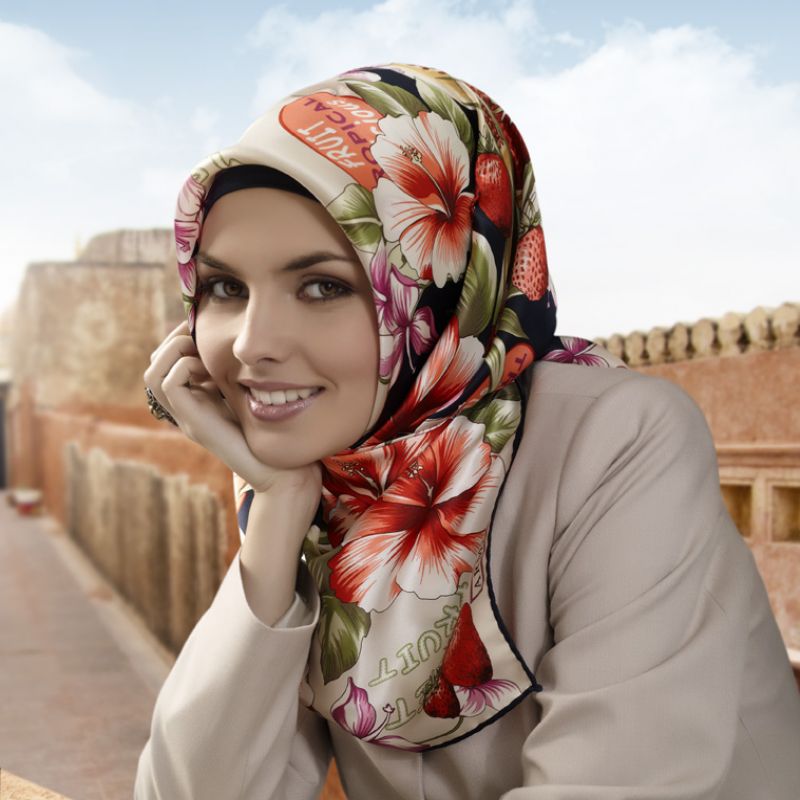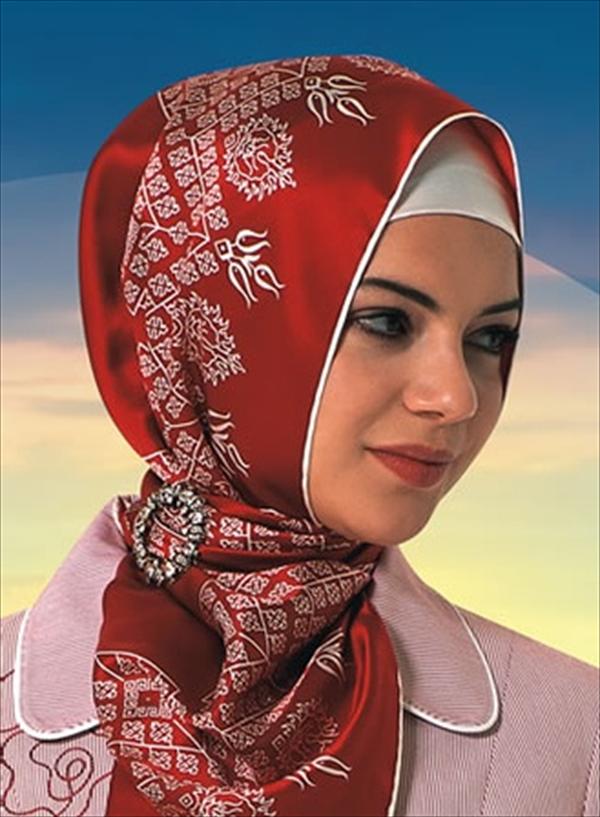About Turkish Hijab
Source (google.com.pk)
With a constitutional principle of official secularism, the Turkish government has traditionally banned women who wear headscarves from working in the public sector. The ban applies to teachers, lawyers, parliamentarians and others working on state premises. The ban on headscarves in the civil service and educational and political institutions was expanded to cover non-state institutions. Female lawyers and journalists who refused to comply with the ban were expelled from public buildings such as courtrooms and universities.[4]
In the late 1970s and early 1980s, the number of university students wearing headscarves increased substantially and in 1984, the first widespread application of headscarf ban came into effect at the universities, but throughout the 1980s and 1990s, the ban was not uniformly enforced and many students were able to graduate. The headscarf ban in public spaces, including schools and universities (public and private), courts of law, government offices and other official institutions, is only for students, workers and public servants. Hence, mothers of pupils or visitors have no problems at all entering the primary schools, but they would not be able to work as teachers. Similarly, at the courts of law, the ban only involves judges, attorneys, lawyers and other workers. Wearing headscarves in photos on official documents like licenses, passports, and university enrollment documents is also prohibited. Universities and schools refused registering women students unless they submit ID photographs with bared hair and neck.[5]
A regulation in, 16 July 1982 specified that: the clothing and appearances of personnel working at public institutions; the rule that female civil servants' head must be uncovered.
An interpretation of this law in 1997 extended the ban to the wearing of headscarves in all universities in Turkey.[6] The debate over headscarves in universities has been the most contentious of all and has been an important element in the politics of Turkey since 2000.[7]
Workplace
According to Country Reports 2007, women who wore headscarves and their supporters "were disciplined or lost their jobs in the public sector" (US 11 March 2008, Sec. 2.c). Human Rights Watch (HRW) reports that in late 2005, the Administrative Supreme Court ruled that a teacher was not eligible for a promotion in her school because she wore a headscarf outside of work (Jan. 2007). An immigration counsellor at the Embassy of Canada in Ankara stated in 27 April 2005 correspondence with the Research Directorate that public servants are not permitted to wear a headscarf while on duty, but headscarved women may be employed in the private sector. In 12 April 2005 correspondence sent to the Research Directorate, a professor of political science specializing in women's issues in Turkey at Bogazici University in Istanbul indicated that women who wear a headscarf "could possibly be denied employment in private or government sectors." Conversely, some municipalities with a more traditional constituency might attempt to hire specifically those women who wear a headscarf (Professor 12 April 2005). The professor did add, however, that headscarved women generally experience difficulty in obtaining positions as teachers, judges, lawyers, or doctors in the public service (ibid.). More recent or corroborating information on the headscarf ban in the public service could not be found among the sources consulted by the Research Directorate.
The London-based Sunday Times reports that while the ban is officially in place only in the public sphere, many private firms similarly avoid hiring women who wear headscarves (6 May 2007). MERO notes that women who wear headscarves may have more difficulty finding a job or obtaining a desirable wage (Apr. 2008), although this could not be corroborated among the sources consulted by the Research Directorate.
Medical care
According to the Sunday Times, headscarves are banned inside Turkish hospitals, and doctors may not don a headscarf on the job (6 May 2007). Nevertheless, MERO reports that under Turkey's current administration, seen by secularists to have a hidden religious agenda (The New York Times 19 February 2008; Washington Post 26 February 2008), doctors who wear headscarves have been employed in some public hospitals (MERO Apr. 2008).
The professor of political science at Bogazici University in Turkey stated that, in addition to never having come across any cases where women wearing headscarves had been denied access to medical care in private or public medical centres, he felt it would be unlikely that this would occur (12 April 2005). The Immigration Counsellor at the Embassy of Canada in Ankara stated that "women who wear headscarves have full access to medical care" (27 April 2005), though news reports [8] and NGO reports to the UN[9] confirm that "women wearing the headscarf have been denied medical care in Turkish hospitals."[9]
Controversial events
Turkish women wearing modern headscarves (echarpe)
In 1968, a female university student, Hatice Babacan, refused to remove her headscarf and from then onwards, although there was not a uniformly applied ban, some problems began to arise for students wearing headscarves at universities.
In 1998, a Turkish student was banned for wearing a headscarf at Istanbul University.[10][not in citation given]
In 2000, Nuray Bezirgan, a Turkish female student, wore a headscarf at her college final exams. A Turkish court sentenced her to six months jail for "obstructing the education of others".[10][not in citation given] The European Court of Human Rights upheld the ban in 2004, saying the rules on dress were "necessary" and did not violate the European Convention on Human Rights.[10][not in citation given] In October 2006, the European Court of Human Rights upheld the university ban again, rejecting a complaint filed by another Turkish university student.[11]
In May 1999, the ban on headscarves in the public sphere hit the headlines when Merve Kavakçı was prevented from taking her oath in the National Assembly because she wore a headscarf. She was the newly elected-MP of Istanbul of the pro-Islamist Virtue Party, and she refused demands to leave the building. The secular opposition members protested by chanting 'out' for 30 minutes, and the then prime minister Bülent Ecevit accused her of violating the principles of secularism.[12] A state prosecutor investigated whether she might be put on trial for provoking religious hatred.[13] She received much support from Iran, by the Ayatollah Ahmad Jannati and hundreds of women demonstrating in support of the deputy.[14] A few months later her Turkish citizenship was revoked because she also held an American citizenship.[15]
In October 2006, Turkish president Ahmet Necdet Sezer refused to allow AKP politicians whose wives wore headscarves to a ball marking Turkish independence, saying it would "compromise" and undermine the secular state founded by Atatürk.[16]
In March 2009, Kıymet Özgür who wore the çarşaf (chador) was attacked by CHP members when she tried to get into an election bus of mayoral candidate Kemal Kılıçdaroğlu in Istanbul. It was later known she had disguised herself to test the party's new initiative.[17]
The CHP (Republican People's Party) is a Kemalist party, however, its then leader Deniz Baykal surprised supporters by allowing those who wear the çarşaf (chador) to become members of the party in late 2008. The surprising move was viewed as to attract conservative voters to the party.[18] Some people criticised Baykal's move as betraying the heritage of the historical party.
Turkish Hijab Abaya Designs 2014 Dress Collection Dubai Styles Fashion Pics Photos Images Wallpapers

Turkish Hijab Abaya Designs 2014 Dress Collection Dubai Styles Fashion Pics Photos Images Wallpapers

Turkish Hijab Abaya Designs 2014 Dress Collection Dubai Styles Fashion Pics Photos Images Wallpapers

Turkish Hijab Abaya Designs 2014 Dress Collection Dubai Styles Fashion Pics Photos Images Wallpapers

Turkish Hijab Abaya Designs 2014 Dress Collection Dubai Styles Fashion Pics Photos Images Wallpapers

Turkish Hijab Abaya Designs 2014 Dress Collection Dubai Styles Fashion Pics Photos Images Wallpapers

Turkish Hijab Abaya Designs 2014 Dress Collection Dubai Styles Fashion Pics Photos Images Wallpapers

Turkish Hijab Abaya Designs 2014 Dress Collection Dubai Styles Fashion Pics Photos Images Wallpapers

Turkish Hijab Abaya Designs 2014 Dress Collection Dubai Styles Fashion Pics Photos Images Wallpapers

Turkish Hijab Abaya Designs 2014 Dress Collection Dubai Styles Fashion Pics Photos Images Wallpapers

Turkish Hijab Abaya Designs 2014 Dress Collection Dubai Styles Fashion Pics Photos Images Wallpapers

Turkish Hijab Abaya Designs 2014 Dress Collection Dubai Styles Fashion Pics Photos Images Wallpapers

Turkish Hijab Abaya Designs 2014 Dress Collection Dubai Styles Fashion Pics Photos Images Wallpapers

Turkish Hijab Abaya Designs 2014 Dress Collection Dubai Styles Fashion Pics Photos Images Wallpapers

Turkish Hijab Abaya Designs 2014 Dress Collection Dubai Styles Fashion Pics Photos Images Wallpapers

Turkish Hijab Abaya Designs 2014 Dress Collection Dubai Styles Fashion Pics Photos Images Wallpapers

Turkish Hijab Abaya Designs 2014 Dress Collection Dubai Styles Fashion Pics Photos Images Wallpapers

Turkish Hijab Abaya Designs 2014 Dress Collection Dubai Styles Fashion Pics Photos Images Wallpapers

Turkish Hijab Abaya Designs 2014 Dress Collection Dubai Styles Fashion Pics Photos Images Wallpapers

Turkish Hijab Abaya Designs 2014 Dress Collection Dubai Styles Fashion Pics Photos Images Wallpapers

Turkish Hijab Abaya Designs 2014 Dress Collection Dubai Styles Fashion Pics Photos Images Wallpapers
.jpg)
Turkish Hijab Abaya Designs 2014 Dress Collection Dubai Styles Fashion Pics Photos Images Wallpapers

No comments:
Post a Comment